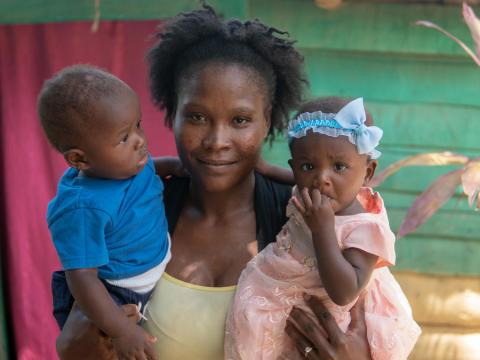How does World Vision protect, promote and support breastfeeding?

Appropriate Breastfeeding is one of the core interventions in World Vision’s Health and Nutrition Sector Approach Strategy and is a vital component in all our nutrition-related programmes.
WORLD VISION'S MESSAGE
We protect, promote and support exclusive breastfeeding from birth until six months of age, and continued breastfeeding, with appropriate complementary feeding until two years of age and beyond, as per WHO/UNICEF infant feeding recommendations.
These are priority interventions are essential to the well-being of infants and young children.
They include:
-
Initiating breastfeeding during the first hour after delivery
-
Exclusive breastfeeding for the first six months of life (no other liquids or solids, apart from medicines as directed by a doctor)
-
Continued breastfeeding up to two years and beyond (with the introduction of appropriate complementary foods beginning at six months of age)
World Vision is a member of the Global Breastfeeding Collective and supports the WHO International Code of Marketing of Breastmilk Substitutes.
How does World Vision Protect, Promote and Support Breastfeeding?

We train community health workers
The Global Strategy for Infant and Young Child Feeding states that "even though it is a natural act, breastfeeding is also a learned behaviour.
Virtually all mothers can breastfeed, provided they have accurate information and support within their families and communities, and from the healthcare system.
They should also have access to skilled practical help from, for example, trained health workers, lay and peer counsellors as well as certified lactation consultants who can help to build mothers' confidence, improve feeding techniques and prevent or resolve breastfeeding problems."
Two of the key ways World Vision works to do this include training Community Health Workers to support exclusive breastfeeding counselling for pregnant and lactating women and by promoting peer (parent/mother-to-mother) support groups.
World Vision's Baby-Friendly Community Initiative in Kenya, funded by UNICEF in partnership with Ministry of Health and county governments, utilises Mother-to-Mother Support Groups, led by trained Community Health Volunteers.
Community Health Workers like Millicent are being trained to support women to exclusively breastfeed their babies for the first six months of life as part of World Vision's Irish Aid-funded AIM Health Plus project. This video features Joseph Musa, AIM Health Plus Project Manager, who says, "We work closely with Community Health Workers and we encourage them to work with the women at the community level where we encourage all women that deliver at health facilities to do exclusive breastfeeding."
Soe Myat Thu learned about breastfeeding through World Vision’s GAC-funded ENRICH project . Today, a Lead Mother in a care group programme in her rural community in Myanmar.
Christine learned about overcoming cultural barriers to early and exclusive breastfeeding from a community health worker in her community in Uganda and her twin daughters are thriving. World Vision’s Australian-funded Northern Uganda Health and WASH Technical Project (NUREP) has trained and supported more than 300 community health workers locally known as “village doctors.”
Florence joined a Mother Care Group in her community in Eastern Uganda where she learned about the benefits of exclusive breastfeeding from a Lead Mother trained by World Vision’s AIM Health Plus project, funded by Irish Aid. Today, she sees the difference in her youngest child and wishes she could rewind history for her older children, who were not exclusively breastfed.
Learn more about World Vision's work with Community Health Workers.
We work with fathers, grandmothers and mothers
To achieve social behavioural change around infant and young child feeding, men have an important role to play.
Ghada and Bassam participated in World Vision's Go Baby Go program in Jerusalem and West Bank, and share about the education and support they received after their first child was born. Bassam reflects, "I encourage every husband to support his wife...because that will help her to continue to breastfeed the baby well, which will strengthen the immune system of the baby and ensure a healthy life for both."
Oad has become a strong support to his wife, Lamphane, around exclusive breastfeeding their youngest child since joining a Community-Change (C-Change) group focussed on gender equality. This was established by the EU-funded Accelerating Health and Nutrition (AHAN) project, in their community in Lao PDR. “Joining the C-Change group is a new good step for our family,” says Lamphane.
My husband helps me more with the housework, collecting water, storing the wood [and] cooking. Now, I have more time to breastfeed.
We also recognise the key role grandmothers play in caring for young children and advising and educating younger women on all aspects of family well-being. As a result, we are working to intentionally involve grandmothers and empower them in their traditional roles, so they can be more effective in improving the nutrition, health and development of their families and subsequent generations.
Meet the Super Grannies of Cambodia

We protect breastfeeding in the world's most dangerous places and emergency settings
World Vision sets up breastfeeding corners or spaces called Women, Adolescent and Young Child Space, or WAYCS, to provide safe places for mothers and their children, to gather for counselling on breastfeeding.
Learn about common myths about breastfeeding in emergency settings.
World Vision’s internal policy regarding the procurement and use of milk and milk products emphasises that World Vision protects, promotes and supports breastfeeding, and safe and appropriate infant and young child feeding practices, upholding the provisions of the International Code of Marketing of Breast Milk Substitutes. It also includes clear guidelines regarding the distribution of breast milk substitutes.

We advocate for infant and young child nutrition, including exclusive breastfeeding
World Vision actively supports the global goal of increasing the prevalence of exclusive breastfeeding to 70 percent by 2030.
Enabling more mothers to exclusively breastfeed will require significant changes in national policy as well as increased support by competent breastfeeding counsellors at the community level.
Find out more about our vision for children’s health and nutrition.
